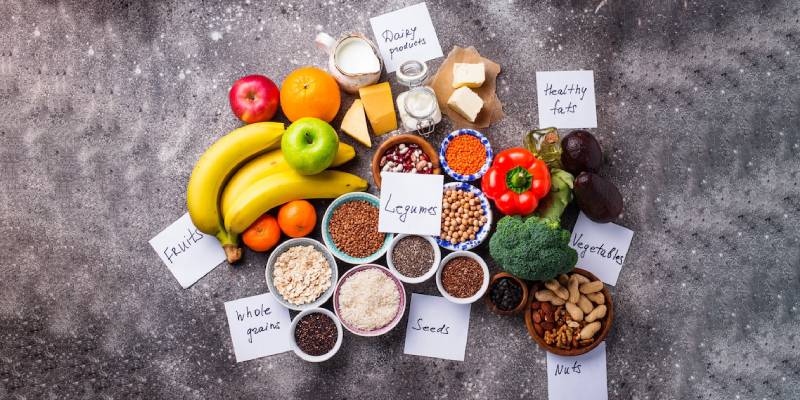If you’re one of the millions of people struggling with hypothyroidism, you know how challenging it can be to shed those extra pounds. Hypothyroidism affects your metabolism, making weight loss a complex and frustrating journey.
However, with the right knowledge and proper guidance and support, it’s not an impossible feat.
In this comprehensive blog, we talk about managing your metabolism and creating an effective weight loss diet plan specifically designed for individuals with hypothyroidism.
From understanding the impact of your thyroid on weight loss to exploring the right foods, exercise routines, and lifestyle adjustments, you’re about to learn a lot about weight loss diet plan for hypothyroidism! Keep reading!
How Can Hypothyroidism Impact Weight Loss?

Hypothyroidism can substantially impact weight loss because of its effect on the body’s metabolism. The metabolic rate slows down when the thyroid gland does not create enough thyroid hormones. This slowing of metabolism makes it more difficult for the body to burn calories, which can result in weight gain or difficulty losing weight.
Furthermore, hypothyroidism frequently causes water retention and bloating, hindering weight loss efforts. The condition may also induce weariness and low energy levels, making physical exercise difficult.
Understanding these effects is crucial in developing a weight loss plan for individuals with hypothyroidism. Make sure you emphasise strategies that support metabolism, address hormonal imbalances, and promote overall well-being.
Important Nutrients To Intake For Hypothyroidism

When it comes to managing hypothyroidism, paying attention to your nutrient intake is crucial. Certain nutrients play a vital role in supporting thyroid function and optimising overall health.
Here are some important nutrients to include in your diet if you have hypothyroidism:
– Iodine
Iodine is essential for the production of thyroid hormones. Iodine-rich foods such as seaweed, iodised salt, shellfish, and dairy products can help ensure appropriate iodine consumption. However, excessive iodine consumption should be avoided as it can impair thyroid function.
– Selenium
Selenium is an antioxidant mineral that helps convert dormant thyroid hormone (T4) to active thyroid hormone (T3). Brazil nuts, shellfish, eggs, and sunflower seeds are all high in selenium. Keep in mind that exceeding the recommended dosage of selenium might be dangerous.
– Zinc
Zinc helps in the production and regulation of thyroid hormones. Oysters, steak, chicken, pumpkin seeds, and lentils are zinc-rich foods. A healthy zinc intake can help support thyroid function and boost general health.
– Vitamin D
Thyroid problems have been linked to vitamin D insufficiency. Spending time in the sun and eating vitamin D-rich foods such as fatty fish, fortified dairy products, and egg yolks can help keep vitamin D levels stable. Your doctor may also advise you to take vitamin D supplements if necessary.
– Iron
Iron deficiency is frequent in hypothyroid patients and can increase symptoms such as fatigue. Iron-rich foods such as lean meats, seafood, spinach, and beans should be included in your diet. Consider consuming iron-rich foods with vitamin C sources for better absorption.
– B Vitamins
B vitamins are essential for thyroid function and energy metabolism. Include whole grains, leafy greens, legumes, and nuts in your diet to guarantee appropriate B vitamin intake.
With the right medication and lifestyle changes, a well-balanced diet high in these vital nutrients can help support thyroid function and enhance overall well-being.
All About Food: What To Eat And Avoid

When it comes to managing hypothyroidism, making informed choices about the foods you consume is crucial. Certain foods can support thyroid function, while others may interfere with hormone production or nutrient absorption.
Here’s a guide on what to eat and avoid for optimal management of hypothyroidism:
Foods To Eat
- Lean Proteins: Include sources like poultry, fish, legumes, and tofu in your diet. Protein is essential for supporting metabolism and tissue repair.
- Healthy Fats: Include omega-3 fatty acid-rich foods like fatty fish (salmon, sardines), flaxseeds, chia seeds, and walnuts in your diet. Healthy fats are essential for hormone synthesis and cellular function.
- Fruits and Vegetables: For a dose of vital vitamins, minerals, and antioxidants, choose a colourful array of fruits and vegetables. Greens, berries, carrots, and bell peppers are all good options.
- Whole Grains: Choose whole grains over refined grains such as quinoa, brown rice, and oats. Whole grains are high in nutrients and help with digestion.
- Probiotic-Rich Foods: Probiotics can be found in fermented foods such as yoghurt, kefir, sauerkraut, and kimchi. They help maintain a healthy gut microbiome and improve nutrition absorption.
Foods To Avoid or Limit
- Cruciferous vegetables: Limit your consumption of veggies such as broccoli, cauliflower, brussels sprouts, and cabbage. These contain chemicals that can inhibit iodine absorption, particularly when ingested raw or in large quantities.
- Soy-based products: Soy-based foods such as soy milk, tofu, and edamame should be avoided since they can suppress thyroid hormone production.
- Gluten: Gluten intolerance can occur in some hypothyroid patients. If symptoms improve, consider limiting or eliminating gluten-containing foods such as wheat, barley, and rye.
- Processed foods: Reduce your intake of processed foods that are high in refined sugars, unhealthy fats, and additives. These can cause inflammation and upset hormonal balance.
- Excess caffeine: Drinking too much caffeine, like coffee and energy drinks, can cause thyroid problems and affect your sleep.
It’s important to note that individual responses to certain foods may vary. Consider keeping a food diary to identify any specific triggers or sensitivities.
And of course, consult a doctor who can help you better understand your body.
7 Tips on Weight Loss Diet Plan for Hypothyroidism

With the right approach, you can achieve your weight loss goals while managing your thyroid condition. Here are seven tips to help you on your weight loss journey:
7. Optimise Your Medication
Ensure that your hypothyroidism is adequately managed with medication prescribed by your doctor. Taking the proper amount of thyroid hormone replacement medicine can help control your metabolism and support your weight loss efforts.
6. Focus On Nutrient-Dense Foods
Include more whole, nutrient-dense foods in your diet. Eat plenty of fruits and vegetables, lean proteins, whole grains, and healthy fats. These foods are high in key nutrients and promote general wellness.
5. Control Portion Sizes
Pay attention to portion sizes when controlling your calorie intake. To correctly measure your portions, use measuring cups or a food scale, and focus on your body’s hunger and fullness signs.
4. Stay Hydrated
Drinking plenty of water is good for your overall health and can help you lose weight. Water can help you control your appetite and stay hydrated throughout the day. Aim for 8 cups of water every day.
3. Engage in Regular Physical Activity
Regular exercise is good for weight loss and overall health. Choose fun pastimes such as walking, swimming, cycling, or yoga. Exercise at least 150 minutes a week at a moderate intensity.
2. Manage Stress Levels
Chronic stress can have an impact on weight loss efforts and thyroid function. Find healthy stress-management skills, such as learning relaxation techniques, participating in hobbies, getting enough sleep, and getting help from loved ones or a therapist.
1. Monitor Your Progress and Adjust As needed
Keep track of your weight loss progress, but also of how you’re feeling. If you’re not getting the results you want, talk to a doctor or a certified dietitian about changing your food and exercise routine.
Try The Premium Plus Weight Loss Program At VeCura Wellness!
VeCura Wellness presents – The Premier Plus Weight Loss program, a safe and simple solution for weight loss. Our program utilises multiple treatments to boost metabolism, burn calories, and help in body toning.
With a dedicated team of wellness specialists, you will receive personalised guidance throughout the process. Our sessions are carefully designed to ensure minimal downtime after each treatment.
Why choose VeCura Wellness?
- Safe and scientifically-proven treatments.
- Tailored consultations to meet your individual needs.
- Session-focused care for optimal results.
Conclusion
Managing weight loss with hypothyroidism requires a tailored approach that considers the unique challenges posed by this condition. When it comes to weight loss, the key is to focus on sustainable habits rather than quick fixes.
By understanding the impact of your thyroid on weight loss and implementing the right strategies, you can overcome the obstacles and achieve your goals. Remember to consult with a healthcare professional or a registered dietitian specialising in thyroid health for personalised guidance.
Note: To explore more engaging content and stay connected, feel free to visit VeCura Wellness YouTube Channel for exciting videos, insightful discussions, and much more.
Frequently Asked Questions (FAQs)
1. What is the best diet to lose weight fast with hypothyroidism?
Concentrate on eating veggies, fruits, lean meats, and healthy fats if you want to reduce weight with hypothyroidism. Compared to processed and high-sugar foods, these foods make you feel full more quickly and can help you maintain a healthy weight.
2. How many calories should I eat a day to lose weight with hypothyroidism?
This varies depending on your age, gender, weight, and activity level. An expert healthcare practitioner or qualified dietician can assess your needs better.
3. What are the 3 worst foods for thyroid?
Fried fast food, salty processed foods, and sugary treats are the three most dangerous foods for thyroid patients.
4. What is a good breakfast for hypothyroidism?
A healthy breakfast option for hypothyroidism patients is eggs. Eggs are a lean protein that contains the minerals iodine and selenium required for healthy thyroid function. You can pair it with avocado toast for a fuller and healthier meal.
5. Which exercise is best for thyroid?
Walking is the most effective and easiest exercise for thyroid patients to lose weight. People with hypothyroidism can engage in this low-impact workout any place.


0 Comments